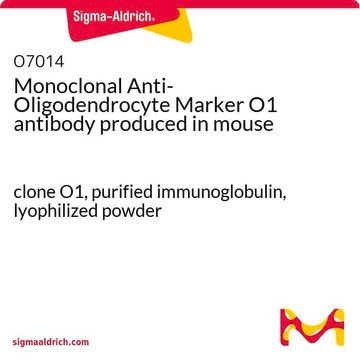O7139
Monoclonal Anti-Oligodendrocyte Marker O4 antibody produced in mouse
clone O4, purified immunoglobulin, lyophilized powder
Synonym(s):
Oligodendrocyte Marker O4 Antibody
About This Item
Recommended Products
biological source
mouse
Quality Level
conjugate
unconjugated
antibody form
purified immunoglobulin
antibody product type
primary antibodies
clone
O4, monoclonal
form
lyophilized powder
species reactivity
mouse, rat, chicken, human
technique(s)
flow cytometry: 0.25 μg/106 cells (rate differentiated cortical stem cells)
immunocytochemistry: 1-10 μg/mL
isotype
IgM
shipped in
wet ice
storage temp.
−20°C
target post-translational modification
unmodified
Gene Information
human ... OMG(4974)
General description
Immunogen
Application
Biochem/physiol Actions
Physical form
Disclaimer
Not finding the right product?
Try our Product Selector Tool.
related product
Storage Class Code
11 - Combustible Solids
WGK
WGK 1
Flash Point(F)
Not applicable
Flash Point(C)
Not applicable
Personal Protective Equipment
Certificates of Analysis (COA)
Search for Certificates of Analysis (COA) by entering the products Lot/Batch Number. Lot and Batch Numbers can be found on a product’s label following the words ‘Lot’ or ‘Batch’.
Already Own This Product?
Find documentation for the products that you have recently purchased in the Document Library.
Customers Also Viewed
Our team of scientists has experience in all areas of research including Life Science, Material Science, Chemical Synthesis, Chromatography, Analytical and many others.
Contact Technical Service









